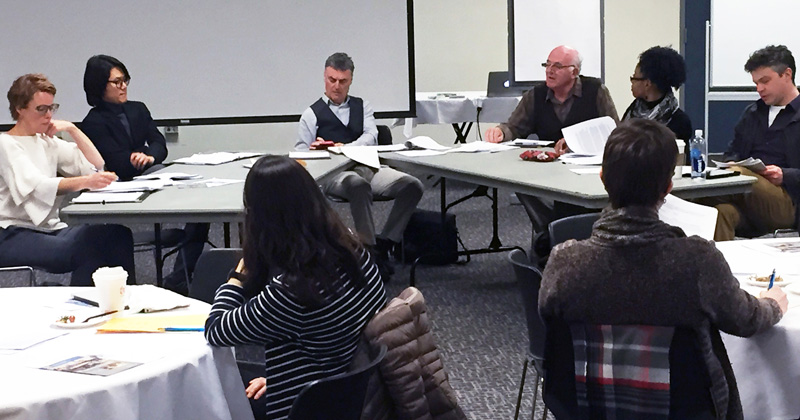


Tackling institutional climate
Photo by Cindy Hall April 25, 2018
Performance theatre sparks dialogue among faculty, administrators
University of Delaware department chairs and faculty were recently treated to a unique form of professional development programming: live performance theatre.
On Monday, April 9, the ADVANCE Institute hosted the award-winning University of Michigan Center for Research on Learning and Teaching (CRLT) Players for two presentations related to institutional climate: “The Chair’s Role in Faculty Mentoring” and “Faculty Meeting: Navigating Departmental Politics.”
“These unique performances were engaging and enlightening, and the novel format should have a meaningful impact on attendees,” said UD Interim Provost Robin W. Morgan. “I appreciate ADVANCE bringing this creative and interactive learning opportunity to the University.”
The CRLT Players performances are based on published research and data collection. According to Sara Armstrong, artistic director, theatre is an effective learning format because it provides familiar dynamics and allows faculty to relate the issues portrayed to their own personal experiences and find ways to proactively meet those challenges.
“The Chair’s Role in Faculty Mentoring,” attended by 32 UD administrators and department chairs, focused on three case studies—one about a new faculty hire, one related to a pre-tenure faculty review and one focused on an interaction with a post-tenure faculty member and her department chair. After each skit, attendees were asked to discuss what they had seen, pointing out positive and negative behaviors they observed. Their discussion focused on how to best cultivate and support a productive mentoring relationship between faculty members and their academic leaders.
Attendees reported the following lessons learned:
Clear strategies for a welcoming environment wherein all opinions are valued.
The need for mentoring to happen at all levels and for mentor training.
The importance of examining the context for interactions.
The importance of making more time to engage with faculty to hear their concerns.
“Faculty Meeting” presented interactions between individuals in a department seeking a new faculty hire. The audience, which consisted of 35 UD faculty, watched the cast act out scenarios from faculty search committee meetings and then considered what practices and interactions might negatively impact the recruitment of a diverse and excellent faculty.
Attendees identified several moments of dysfunction and tension during the interactions, including bias, alliances, a dominant personality who occupied the decision making, lack of agreement on recruitment goals and what constitutes excellence, and a junior faculty member who was not supported. The group then noted several tactics that could address the issues depicted and create an improved climate:
Actively seek out information before a meeting and build relationships.
Have an explicit strategy and robust process in advance of a meeting and reiterate it as needed to hold participants accountable.
Always tie the discussion of candidates to the search criteria.
When discussing candidates, stick to the facts versus using evaluative language.
Ensure everyone on the search committee shares their perspective at meetings.
Have private, confidential votes on candidates rather than voting during the search committee meeting.
Have a one-on-one dialogue with difficult committee members to determine the motivation behind their behavior.
Rich Braun, professor in the Department of Mathematical Sciences who attended the faculty session, said, “Many of the issues the Players demonstrated we see often. While there are no easy solutions, the workshop demonstrated that an effective approach is to use patient, determined and gentle questioning of unproductive behavior.”
Contact Us
Have a UDaily story idea?
Contact us at ocm@udel.edu
Members of the press
Contact us at 302-831-NEWS or visit the Media Relations website

